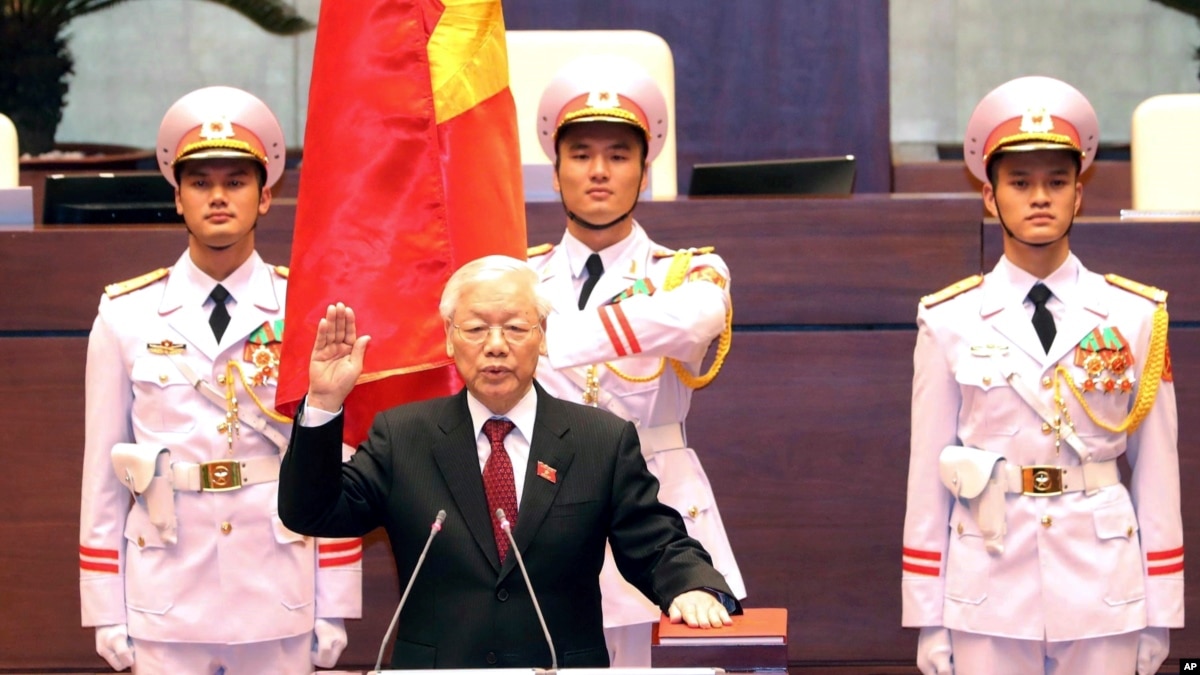
Vietnam's rubber stamp National Assembly elected Communist Party General-Secretary Nguyen Phu Trong as the country's president on Tuesday, consolidating his influence as the most powerful man in the Southeast Asian nation.
The 74-year-old Trong is the first Vietnamese leader to hold the two positions since founding President Ho Chi Minh in the 1960s.
He succeeds President Tran Dai Quang, who died last month after battling a viral illness for more than a year.
Raising one hand and placing the other on the constitution, Trong vowed during the swearing-in ceremony to be "absolutely loyal to the nation, people and the constitution."
He acknowledged in his acceptance speech that despite impressive achievements in recent years, Vietnam faces many challenges. "Many heavy tasks and duties are waiting ahead of us," he said.
Earlier this month, the party's Central Committee endorsed Trong as the sole candidate for the presidency.
Nguyen Khac Giang, a researcher at the Vietnam Institute for Economic and Policy Research in Hanoi, said Trong's serving as general secretary and president could weaken the collective leadership, which was seen as being more democratic than China's single-party rule.
"When power is concentrated in an individual, there's a tendency which could be negative in a way that could lessen the collective leadership inside the party," Giang said.
Vietnam does not have a single paramount leader, with the country run through the collective leadership of the general secretary, president, prime minister and National Assembly chair.
Giang said it's unclear whether the merger of general secretary and president will continue after Trong likely steps down at the next five-year party congress, scheduled for 2021.
Trong, the party's former chief ideologue, was elected to the all-powerful Politburo in 1997, serving as the Communist Party chief of Hanoi and chairman of the National Assembly before being promoted to general secretary in 2011. He was re-elected to another five-year term in January 2016.
Vietnam has seen an increased crackdown on dissidents and corruption, with scores of high-ranking officials and executives jailed since 2016 under Trong's watch.
The anti-corruption drive is likely to continue, according to Le Hong Hiep, a research fellow at the Singapore-based ISEAS-Yusof Ishak Institute.
"With his consolidated power, it's likely that he will continue his signature anti-corruption campaign, a key factor that has helped him strengthen his power and won him the presidency,'' Hiep said.
Trong became the first general secretary to visit former foe the United States when he met with President Barack Obama at the White House in July 2015.
The U.S. Embassy in Hanoi congratulated Trong on his election.
"President Trong's selection comes at a time when our bilateral ties with Vietnam have never been stronger," Ambassador Daniel Kritenbrink said in a statement. "Over the past two decades, the United States and Vietnam have come together to find common purpose based on shared interests. We have expanded our security ties, forged new economic and commercial linkages, and deepened our people-to-people engagement. We share a common desire to promote peace, security, and prosperity in the Indo-Pacific region."
"We look forward to continuing to work closely with President Trong on further strengthening and expanding the U.S.-Vietnam Comprehensive Partnership," Kritenbrink said.

No comments:
Post a Comment